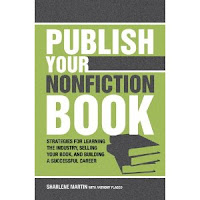Brrr! Come on in out of the cold wind. This cold spell is busily announcing the first week of December. Order yourself a hot drink and listen to Mary Babic as she continues to educate us on the cost of publishing.
"Book publishing costs arise from three areas and the costs can be substantial in all three whether you traditionally publish or self-publish. Here's the story on each cost area:
"1. Writing—If you publish with an established publisher, they may pay for most of the editorial costs, but you may still be responsible for some. For example, you will still spend money for book proposal coaching if you need it or for someone to write the proposal for you. You may also want to hire your own editor before you send the manuscript to the publisher. You pay any costs associated with permissions and indexing. In addition, if you make too many changes once the book has been designed, you may be asked to shell out more money for some of the corrections.
"2. Publishing—If you publish with an established publisher, you won't incur the costs of production. But if you self-publish, you must consider the expense of book design and layout, book cover design including back cover copy, prepress production, indexing, proofreading, and printing. After books are ready for sale, there are the charges of carrying inventory (unless you use a print-on-demand process), packing, and shipping (although shipping costs are ultimately passed on to the purchasers).
"3. Marketing—Even if you use an established publisher, you will be responsible for most of your own promotions and any travel you do to represent the book. For the vast majority of books, a publisher will allocate a budget of $1,000 or less for marketing the book, and that just isn't enough. The publisher may also do some collaterals—bookmarks, event posters, one-sheet flyers—but generally very few.
Here is a rough estimate of the expenditure to produce a professional-quality soft cover book in which you do most of the writing and you self-publish:
- Expected editing costs: $2,000
- Self-publishing production, book interior
design, and layout: $2,500
- Proofreading: $750
- Indexing: $500
- Cover design, listings, print prep: $3,000
- First Printing: $600
(200 review copies at $3 per book,
high-quality, on-demand)
- Collateral materials for book events: $2,000
- Small book launch publicity effort:
press releases and follow-up to trade journals
and targeted media, some local speaking
and exhibiting: $3,000 to $5,000
"You can expect to spend $10,000 to $15,000 and up to self-publish a book and do some modest marketing with increased cash outlay for any additional help you need. Of course, you can spend a lot more at each stage of the process if you don't find a high-quality professional to work with the first time and have to redo some of the original work.
"If you have any questions please visit www.awritersassistant.com"
Thank you, Mary. It always helps to understand the bottom line. Counting the cost before we commit to spending the money will take some of the stress out of our decisions.
Next time I want to talk about money coming in, not money going out. Isn't that a pleasant thought?! So keep writing…






